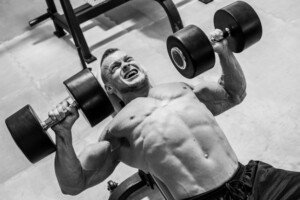
Do you ever wonder if intense chest workouts strain the heart more than heavy deadlifts or squats?
When you do chest routines at the gym, you may have wondered if this puts particular strain on your heart…since chest routines work the chest muscles, which are over your heart.
Furthermore, while performing chest presses (or shortly after, or the day after), perhaps you’ve had “chest pain” (i.e., sore pec muscles).
This may lead you to think that chest presses — particulary heavy benching — strain the heart more than a grueling set of back squats.
However, the heart cannot tell the difference between a bench press and a deadlift or squat.
If the heart is being taxed, it has no idea what body part is being recruited.
Though you may feel more pummeled after a set of intense deadlifts or squats, when compared to a set of bench presses or dumbbell presses, the heart has no idea what you just did.
When the oxygen demands of the body are increased, the heart will beat faster to pump more blood throughout the body — whether you’re straining with chest exercises, deadlifts, pull-ups, running up hills or racing up and down a basketball court.
What makes the heart work harder is the intensity of the exercise.
So if you’re doing a five rep max for the bench press, this will “strain” your heart more than will doing five reps of deadlifts using only 50 percent of your deadlift five RM.
Your heart will be taxed more due to the intensity of the rep max, not the location of the muscles being recruited.
However, a five RM deadlift will tax your cardiovascular systm way more than will a five RM bench press because the deadlift works nearly the entire body — using more muscles — meaning a greater oxygen demand.
Thus, it’s all about exertion, not the location of the muscles being engaged.
In conclusion, location of the muscle worked doesn’t dictate how hard your heart is working.
 Lorra Garrick is a former personal trainer certified through the American Council on Exercise. At Bally Total Fitness she trained women and men of all ages for fat loss, muscle building, fitness and improved health.
Lorra Garrick is a former personal trainer certified through the American Council on Exercise. At Bally Total Fitness she trained women and men of all ages for fat loss, muscle building, fitness and improved health.
.











